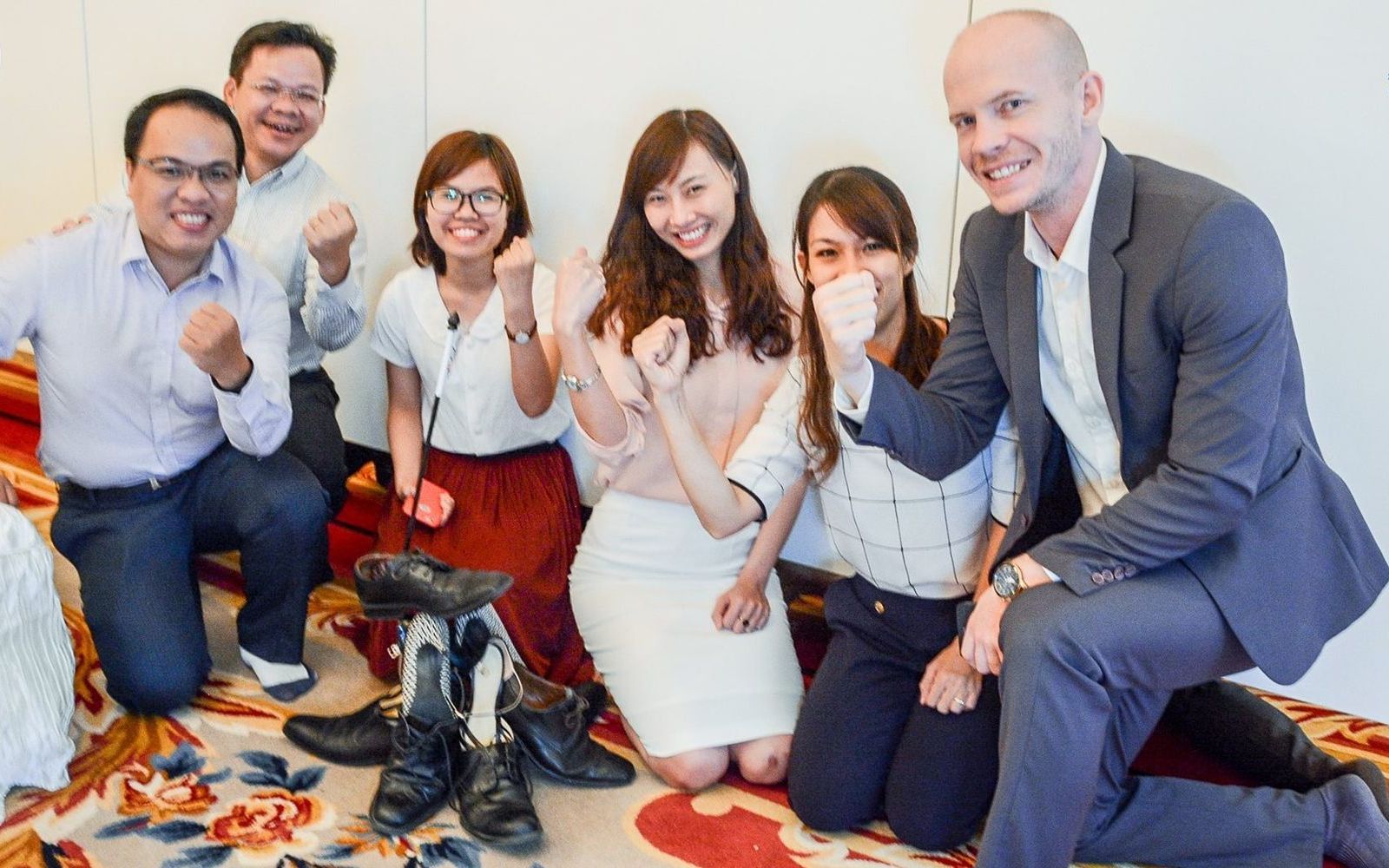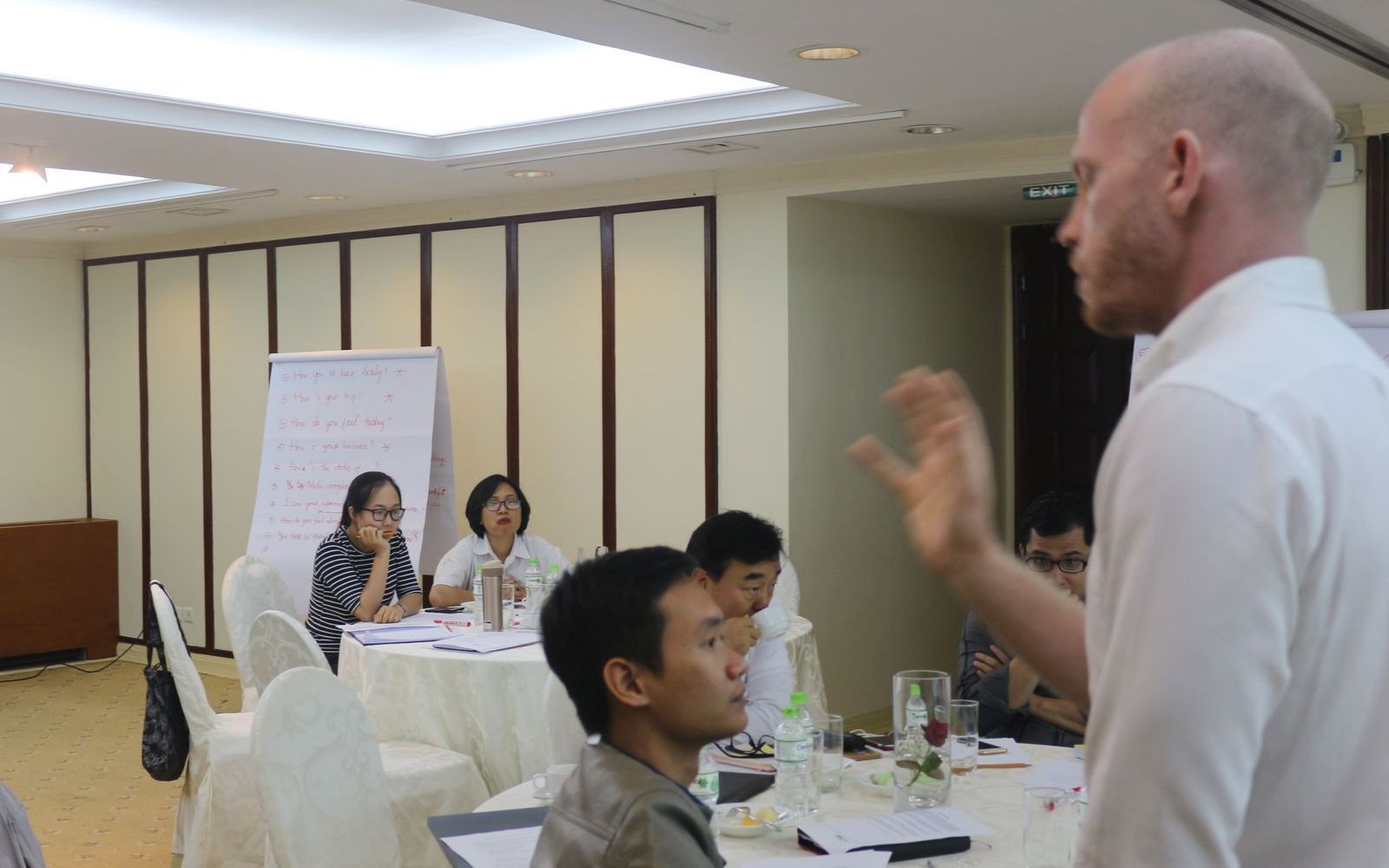10 Tips When Choosing the Best Corporate Training in Vietnam
How to Choose the Best Corporate Training in Vietnam
Dale Carnegie once said, "Knowledge isn’t power until it is applied."
When it comes to investing in training, you want your team not just to acquire knowledge. You also to see them practically apply what they have learned in training.
Finding the best corporate training in Vietnam can be tough.
Vietnam's unique culture and fast-changing business needs mean you have a lot to consider.
If you're running a business in Vietnam, this guide will give you straightforward advice to make a good choice for your team.
Let’s find the training that fits your company’s needs in Vietnam's growing market. consider.
We'll cover important things like matching training to Vietnamese culture, choosing the right teaching methods, dealing with language issues, and focusing on long-term skills.
So let's get started.
Quality Training for Vietnamese Businesses

Have you heard the old joke about the CFO and a CEO discussing staff training?
The CFO wants to save money, so he asks the CEO: is staff training necessary? "What happens if we pay for staff training and they leave?"
The CEO turns the argument around and she replies, "But what happens if we don't pay for staff training, and they stay?"
The fact is that businesses thrive when they invest in developing their people.
High-quality training is crucial for the success of businesses in Vietnam (and anywhere in the world) for several reasons.
List of Services
-
Improved Employee PerformanceList Item 1
High-quality training provides employees with a better understanding of their responsibilities and how to perform them correctly. It helps them develop new skills, acquire new knowledge, and gain a better understanding of the business and its operations.
Well-trained employees are more efficient and productive. They make fewer mistakes and can handle more complex tasks. This can lead to increased productivity and efficiency, which directly impacts the business's bottom line.
-
Employee RetentionList Item 2
High-quality training can increase job satisfaction and employee loyalty. Employees who feel valued and well-equipped to do their job are more likely to stay with the company, reducing turnover costs.
-
Competitive AdvantageList Item 3
Businesses that invest in high-quality training are better positioned to stay competitive. They can adapt faster to changes in the market, innovate, and provide superior service to their customers.
-
Compliance with regulationsList Item 4
Many industries have regulations and standards that businesses must comply with. High-quality training ensures that all employees understand these requirements and can adhere to them, minimizing the risk of non-compliance penalties.
-
Improved Customer Satisfaction:
Employees who are well-trained are more likely to provide excellent customer service. This can lead to better customer satisfaction and loyalty, which can increase profits and the business's reputation.
-
Employee Empowerment
High-quality training empowers employees by giving them the skills and knowledge they need to make decisions and take actions that can benefit the business. This can lead to a more engaged and motivated workforce.
-
Encourages Innovation
Training programs often expose employees to new ideas and ways of thinking. This can foster innovation and creativity, helping the business to stay ahead of the competition.
Understanding the Landscape: Corporate Training in Vietnam Today

Corporate training in Vietnam has undergone significant transformation in recent years.
With the country's rapid economic growth, the demand for a skilled workforce is increasing, leading to a surge in corporate training programs.
Currently, the corporate training landscape in Vietnam is characterized by a blend of traditional classroom-based training and online learning.
And fortunately, more and more Vietnamese companies are investing heavily in employee training and development, recognizing the importance of upskilling and reskilling their workforce to keep up with changing business environments and technological advancements.
The growth of corporate training in Vietnam is fueled by several factors.
Firstly, globalization and market liberalization have increased competition, prompting companies to enhance their employees' skills to maintain a competitive edge.
Secondly, the shift towards a knowledge-based economy has highlighted the need for continuous learning and development.
Finally, the rapid digital transformation in Vietnam has necessitated training in digital skills.
In response to this growing demand, a number of training providers have emerged, offering a wide range of courses in areas such as leadership, sales, customer service, project management, and IT.
These providers are utilizing various training methods, including instructor-led training, eLearning, blended learning, and mobile learning, to cater to different learning preferences and needs.
And let's not forget the COVID-19 pandemic. This certainly accelerated the shift towards digital learning in Vietnam as work -from-home, study-from-home and online courses became part of a "new normal."
Many organizations adopted online training platforms to continue employee development during social distancing measures. This trend has persisted post-pandemic, recognizing the convenience and flexibility of online learning.
Regarding development, corporate training in Vietnam is becoming more strategic and aligned with business goals.
Companies are increasingly focusing on measuring the impact of training on business performance and using analytics to identify skills gaps and tailor training accordingly.
There is also a growing emphasis on soft skills training, as companies recognize the importance of skills such as communication, critical thinking, and creativity in the modern workplace.
And the Vietnamese government is also playing a proactive role in promoting corporate training.
Policies have been implemented to encourage companies to invest in training and to facilitate collaborations between businesses and educational institutions.
10 Components of Effective Corporate Training Programs

So if you want to leverage the benefits of training, you need to make sure you're considering the most important factors in the decision-making process.
1. Clearly Defined Objectives:
The success of a corporate training program largely depends upon well-defined objectives.
These objectives must align with the company's goals and aim to fill employee skill gaps.
The objectives of the training should be based on the needs of the company and not on the ability of the trainer. Therefore, when deciding to invest in training, make sure you've identified the biggest areas that can be improved through training.
2. Relevance to Job Role:
Training programs should be relevant to the participants' job roles. This relevance ensures that employees can apply what they learn during the training to their daily tasks.
For example, since customer service reps are the first line of communication between a company and its customers, they need excellent communication skills.
This training can focus on active listening, empathy, problem-solving, and clear verbal and written communication.
3. Engaging Content:
The training program should be designed with engaging content that promotes active participation.
Easier said than done, right? So how?
Active participation can be achieved by using interactive tools, real-life scenarios, case studies, and practical exercises. And you'll want a flexible trainer who can adjust the plan if necessary to keep the participants enthusiastic.
4. Experienced Trainers:
The quality of the trainer significantly affects the success of the training program. Trainers should be experts in their field and should possess good communication and teaching skills.
You don't want a person with no management experience advising your team on how to manage people. And you don't want a person who has no teaching skills
5. Regular Assessment:
Regular assessment of the employees' understanding, and application of the training content is essential.
This can be done through quizzes, tests, or practical tasks.
Training is an investment, and you want to make sure that your team takes it seriously. Male sure they're accountable.
6. Feedback Mechanism:
A successful training program should incorporate a feedback mechanism. This involves gathering feedback from participants about the effectiveness of the training, which can be used to improve future training programs.
7. Follow-up and Reinforcement:
Training should not end when the program ends. There should be follow-up sessions and reinforcement activities to ensure that the skills and knowledge learned during the training are embedded and retained.
8. Use of Technology:
Incorporating technology such as e-learning platforms, virtual reality, or mobile learning can make training more accessible and flexible for employees, increasing its effectiveness.
9. Personalization:
The training program should cater to the different learning styles and paces of the employees. Personalized learning can increase engagement and retention of the training material.
10. Evaluation of Outcomes:
A successful training program should evaluate the outcomes of the training.
This includes assessing employee performance improvement and the impact on the company's bottom line. This evaluation can help to measure the return on investment of the training program.
Challenges and Solutions in Vietnamese Corporate Training

Corporate training plays a crucial role in business success, but it has its hurdles. Thankfully, with every challenge comes a solution and a strategy to triumph over it.
A common challenge in Vietnamese corporate training is the language barrier.
Most multinational corporations use English, but not all Vietnamese employees are proficient in it. To tackle this, training materials should be translated into Vietnamese, and language classes should be provided to improve employees' English proficiency.
Vietnamese corporate training often relies on traditional, lecture-based learning methods. These methods may not be as effective as experiential learning methods like simulations, role-playing, and group activities, which are more beneficial for practical, hands-on experience.
There's a cultural resistance to change in Vietnam, where stability and tradition are valued. To overcome this, it's important to effectively communicate the benefits of training and changes, ensuring employees understand how new skills will improve their job performance and benefit the company.
Limited technology access in some areas of Vietnam poses a challenge for implementing e-learning or tech-based training methods. Investing in technology and infrastructure, and using hybrid training models that combine online and offline methods can cater to all employees.
Another issue is the lack of qualified trainers who are not only experts in their field but also adept at teaching adults. This can be addressed by hiring experienced trainers, investing in train-the-trainer programs, or partnering with institutions that provide qualified trainers.
Employees' busy schedules often make it difficult to find time for training. Flexible training methods, such as on-demand online training, allow employees to complete training at their own pace. Integrating training into regular work schedules can also help make it a part of their daily routine.
Lastly, training materials in Vietnam may not always be up-to-date or relevant to the local market. Regularly updating and customizing training materials to reflect the unique characteristics and needs of the Vietnamese market is crucial.
Expert Advice: Tips from a Corporate Trainer

As a seasoned corporate trainer, I've come to understand the nuances of effective training in a culturally rich and diverse setting like Vietnam.
Here are some personal insights I'd like to share:
Understanding and respecting the local culture is paramount. When looking for a training program in Vietnam, choosing one that respects and deeply understands Vietnamese customs and societal norms and how these differ from Western cultures is vital.
Interactive learning methods are key. I've found that techniques such as group discussions, role plays, simulations, and hands-on activities greatly enhance engagement and help retain information more effectively than chalk and talk.
Dealing with language differences is a significant aspect to keep in mind. Choose a program and trainer that uses simple English, enhanced with visual aids and practical examples. This approach is important for bridging language gaps and ensuring everyone is on the same page.
The pace of learning should be respected. In Vietnam, allowing participants ample time to absorb new concepts is important. A successful training environment is one where questions are encouraged, and discussions are a regular part of the learning process.
Building relationships is essential for effective training. I always stress the importance of trainers taking the time to really know their participants. This fosters a learning environment based on trust and respect.
Be adaptable in your training style. Recognize the diverse learning styles and cultural nuances. A program that regularly checks for understanding and encourages participation, even from the quieter members, is ideal.
Vietnam has a well-documented hierarchical system. This dynamic within Vietnamese culture cannot be ignored. A training program that respects and works within these structures will be more respectful and effective.
Focus on long-term development. Quick fixes don't lead to sustainable change. The best programs are those committed to ongoing support and development.
Incorporate feedback for continuous improvement. A program that adapts and evolves based on participant feedback will be more effective and tailored to your organization's needs.
Lastly, ensure the training is locally relevant. Content and examples specific to the Vietnamese context will resonate more deeply with participants and aid in the practical application of skills.
In essence, effective corporate training in Vietnam hinges on programs that are culturally attuned, adaptable, and committed to fostering developmental relationships over time.
What's next?
When it comes to investing in training in Vietnam, it’s not only about empowering your team with knowledge but ensuring they have opportunities to apply this learning in their roles. The corporate training solutions you choose should translate into enhanced team performance and leadership development that aligns with the requirements of Vietnam's market.
From Executive Coaching, Corporate Training & Consulting to specialized classes like Digital Marketing Classes, the right training can drive your team and your business forward.
If you’re ready to invest in a training program that aligns with Vietnam's culture of learning and your company’s specific needs, contact us. Let’s turn knowledge into power together.
Contact me for corporate training solutions tailored to your organization’s unique needs in Vietnam.
Let’s work together to turn knowledge into action and drive your business forward.









